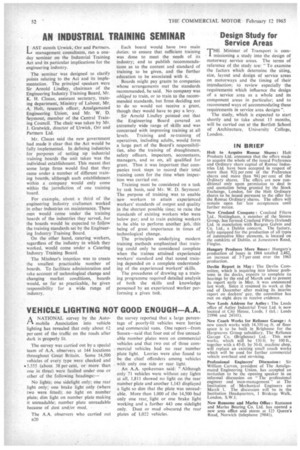AN INDUSTRIAL TRAINING SEMINAR
Page 54

If you've noticed an error in this article please click here to report it so we can fix it.
1 AST month Urwick, Orr and Partners, I-4 management consultants, ran a oneday seminar on the Industrial Training Act and its particular implications for the engineering industry.
The seminar was designed to clarify points relating to the Act and its implementation. The principal speakers were Sir Arnold Lindley, chairman of the Engineering Industry Training Board, Mr. K. H. Clucas, assistant secretary, training department, Ministry of Labour, Mr. A. Holt, research officer, Amalgamated Engineering Union, and Mr. W. D.
• Seymour, member of the Central Training Council. The chair was taken by Mr. J. Gratwick, director of Urwick, Orr and Partners Ltd.
Mr. Clucas said the new government had made it clear that the Act would be fully implemented. In defining industries for purposes of setting up industrial training boards the unit taken was the individual establishment. This meant that some large firms would find that they came under a number of different training boards, although each establishment within a company would only come within the jurisdiction of one training board.
For example, about a third of the engineering industry craftsmen worked in other industries on maintenance. These men would come under the training boards of the industries they served, but the boards would be expected to follow the training standards set by the Engineering Industry Training Board.
On the other hand, catering workers, regardless of the industry in which they worked, would come under a Catering Industry Training Board.
The Minister's intention was to create the smallest practicable number of boards. To facilitate administration and take account of technological change and changing market conditions, boards would, so far as practicable, be given responsibility for a wide range of industry. Each board would have two main duties: to ensure that sufficient training was done to meet the needs of its industry; and to publish recommendations as to the content and standard of training to be given, and the further education to be associated with it.
Boards might pay grants to companies whose arrangements met the standards recommended, he said. No company was obliged to train, or to train to the recommended standards, but firms deciding not to do so would not receive a grant, though they would have to pay a levy.
Sir Arnold Lindley pointed out that the Engineering Board covered an extremely wide range of skills and was concerned with improving training at all levels. Training and re-training of operatives, including adults, would form a large part of the Board's responsibilities, also the training of draughtsmen, safety officers, inspectors, accountants, managers, and so on, all qualified for grant. Thus it was important that companies took steps to record their total training costs for the time when inspection was carried out.
Training must be considered on a task by task basis, said Mr. W. D. Seymour. The purpose of training was to enable new workers to attain experienced workers' standards of output and quality in the shortest possible time; to raise the standards of existing workers who were below par; and to train existing workers to be able to perform another job, this being of great importance in times of technological change.
The principles underlying modern training methods emphasized that training could only he considered complete when the trainee attained experienced workers' standard and that sound training depended on a complete understanding of the experienced workers' skills.
The procedures of drawing up a training programme required detailed analysis of both the skills and knowledge possessed by an experienced worker performing a given task.






























































































































